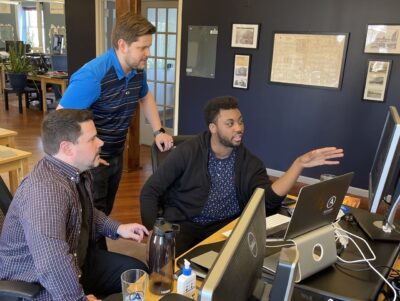Steve Case likes to think about the future, which is good because there’s a lot of future to think about.
In his new book, The Third Wave, the AOL cofounder takes a deep look at the future of innovation. And at a launch party at 1776 on Thursday night, he shared key pieces of his vision for this future, as well as some reflections from the past.
In a lively conversation with 1776 cofounder and co-CEO Donna Harris, Case recalled accidental discoveries that turned out to be super important, his nostalgia for the screeching sound of modems, moments of lost confidence and times when what seemed like failure was actually an opportunity.
“Sometimes the horrible things are horrible,” he said, “but sometimes the things that seem horrible are actually opportunities if you’re paying attention.”
Now that’s some life wisdom.
https://twitter.com/latvia05/status/720753368986173440
Next the conversation turned to the future described in the book, where a few definitions are helpful. Here’s how Case describes “waves” of internet innovation:
- The first wave was the building of the actual internet.
- The second wave was the building of apps and services on top of that internet — this is the stage that, in many ways, we’re still in.
- But Case doesn’t think the future is all Instagram and Snapchat, rather, the third wave will be a time characterized by the seamless integration of the internet into all aspects of our lives.
Intriguing.
According to Case, the third wave will be more similar to the first than it is to the second, a realization that prompted him to write a book melding his experiences with his vision.
The third wave, he says, will be when his “rise of the rest” concept really comes to fruition. Venture capital money will become more distributed geographically, and a broader diversity of founders will be able to find investment. Also, third-wave innovation will focus on industries, like education and healthcare, that really need change. But because these industries are generally more traditional, the path of entrepreneurs is not going to be an easy one. We’ll see fewer “overnight unicorns,” and startups will need to learn to partner with entrenched institutions.
Perhaps unsurprisingly given Case’s recent investment in the incubator, these predictions align closely with the assumptions upon which 1776 is built. 1776 describes itself as a “global incubator and seed fund helping startups transform industries that impact millions of lives every day—education, energy & sustainability, health, transportation and cities,” and prides itself on helping member entrepreneurs get access to these industries.
If Case is correct in his predictions, it’ll be this kind of startup leading the charge in the third wave.
Join the conversation!
Find news, events, jobs and people who share your interests on Technical.ly's open community Slack




